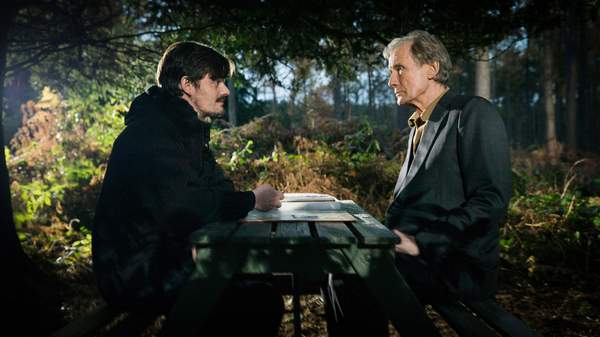Overview
If Wes Anderson was to rove his hyper-stylised gaze over everyday British life, the result might look like Sometimes Always Never. If he transplanted his fondness for melancholy family dysfunction to Merseyside, it could resemble this grief-fuelled drama, too. And if the acclaimed auteur ever decided to set his sights on the game of Scrabble, the end product might also share much in common with Carl Hunter's debut stint as a feature filmmaker. To the director's immense credit, this elegant and tender movie always feels like a relative of Anderson's work instead of an imitation — a kindred spirit with evident similarities, but bearing its own sensibilities.
Sometimes working with noticeably exaggerated backgrounds, always demonstrating a flair for quirkiness and precision in tandem, and never overplaying his aesthetic approach, Hunter turns Sometimes Always Never into a visual playground. Every stylistic choice reflects the inner states of the film's characters, with the first-timer's images doubling as an imaginative escape. Even when the movie merely watches the fashionable but forlorn Alan (Bill Nighy) wandering along a beachfront, takes him on a country road trip with his silently resentful son Peter (Sam Riley), or spies more than a few folks slinging Scrabble tiles, it does so with a curious and perceptive eye. Hunter understands the creative truth that sits at the heart of whimsy, surrealism and flights of fantasy, and at the heart of this picture as well: that finding a little magic in ordinary surroundings is a simple but effective coping mechanism.
A retired tailor who hasn't lost his sense of style, Alan has plenty of worries that he'd happily avoid. His relationship with Peter is cordial but strained, his other son disappeared without a trace years earlier and, thanks to his preferred pastime, he'd rather work his charms on words than people. When a development in the missing person case doesn't turn out as hoped, Alan is caught at a crossroads. He can unofficially move into Peter's house, play nice with his daughter-in-law (Alice Lowe) and teenage grandson (Louis Healy), and keep deploying Scrabble as a distraction, or he can face his woes, stop wallowing on what he's lost and appreciate what he has left.
Whether it's played casually between friends and family or competitively with money at stake, Scrabble requires a combination of inventiveness and rigour. A willingness to take risks is just as important as an extensive vocabulary — and although Alan knows this all too well, he's slow to apply the same thinking to his world in general. While Frank Cottrell Boyce's screenplay embraces life's troubles as much as its joys, it's never less than a pleasure to watch Something Always Never run its course. Indeed, there's an entrancing power to the movie's story and mood, with both acknowledging the many ways that grief can leave an imprint. Sometimes the film's sentiments prove a little too neat, but that's the exception rather than the rule.
Intricate and vivid even when painted in subdued colours, Hunter's eye-catching imagery helps considerably, immersing viewers in the movie's distinctive tone and narrative realm. But pretty pictures can't pierce the heart quite like a slate of excellent performances, which Something Always Never boasts in spades. It's a testament to Nighy's talents that the veteran actor retains his familiar vibe, yet completely inhabits his character. It's a testament to Riley, Lowe and virtual newcomer Healy that they more than hold their own against their experienced co-star, as do fellow supports Jenny Agutter and Tim McInnerny. Among all of the film's astute elements, the great work of its cast ranks among the most crucial. You can't win at Scrabble without playing multiple hands, and you can't make an eccentric, insightful treatise on mourning and moving on without the handiwork of multiple players.
Features
Information
When
Thursday, March 14, 2019 - Wednesday, May 8, 2019
Thursday, March 14 - Wednesday, May 8, 2019
Where
Various cinemas in MelbournePrice
$15–25-
Event Type
